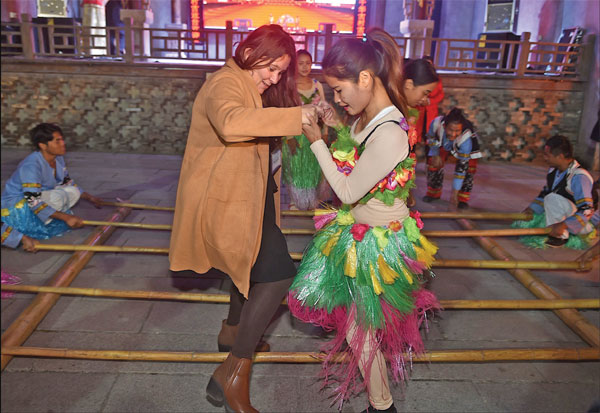IN BRIEF (Page 2)

| A diplomat tries bamboo dancing in Qianhua village of Jurong, Jiangsu province, on Nov 13. Envoys and their families from eight countries - Afghanistan, Brazil, Egypt, Sri Lanka, Cambodia, Tanzania, Nepal and Niger - visited scenic spots and learned more about traditional Chinese folk handicrafts. Shao Dan / For China Daily |
Laos warmly greets Xi in first state visit
China and Laos agreed to jointly build the Belt and Road and enhance cooperation on multiple issues, including agriculture, during President Xi Jinping's state visit on Nov 13. Xi and Laotian President Bounnhang Vorachith witnessed the signing of 16 documents to enhance collaboration in areas such as finance, trade, infrastructure and people-to-people exchanges. Xi, who was given an enthusiastic reception in the Laotian capital of Vientiane, is on his first state visit to Laos since becoming president in March 2013, as well as his first visit since becoming general secretary of the 18th Communist Party of China Central Committee in late 2012. The two countries agreed to connect the China-proposed Belt and Road Initiative with the Laotian strategy of making a landlocked nation into a country with many connections.
Talks on South China Sea code of conduct to begin
China and member countries of the Association of Southeast Asian Nations said on Nov 13 they would begin talks on details of a code of conduct in the South China Sea. Premier Li Keqiang made the proposal at the 20th China-ASEAN (10+1) leaders' meeting in Manila, the Foreign Ministry said. Philippine President Rodrigo Duterte, ASEAN's rotating chairman this year, said the organization agreed to start the talks on the code of conduct, presidential spokesman Harry Roque told the Philippine Daily Inquirer. At the meeting, ASEAN countries responded positively to the start of negotiations, according to a Chinese news release after the meeting. The meeting was attended by all government leaders of the 10 member countries of the regional organization.
Death penalty urged for suspect in Japan
Jiang Qiulian, the mother of Jiang Ge, 24, who was found dead with multiple stab wounds in the corridor of her Tokyo apartment on Nov 3 last year, said in her micro blog that she went to Japan on Nov 4 with the aim of building public support for the death penalty for the suspect, Chen Shifeng. Four activities to drum up support were held in Tokyo's Ikebukuro district on Nov 11 and 12, while an online petition to collect signatures - set to end on Nov 30 - continues, according to her post. The case will be publicly heard on Dec 11 in Tokyo. Under Japanese law, people can be sentenced to death only if they are found guilty of "very serious" crimes - but in this case, there was just one death, which may not meet the standard in Japan, according to Inoue Aki, an assistant and interpreter for a lawyer who represents the mother.
Expertise on dialysis for children shared online
Children's Hospital at Fudan University in Shanghai announced on Nov 13 the establishment of an international exchange school for automatic peritoneal dialysis for children with kidney problems. Peritoneal dialysis is a way to remove waste from the blood when the kidneys fail. Through a live internet broadcast, more than 30 doctors and nurses specializing in pediatric kidney diseases from Hong Kong and Taiwan as well as Thailand, Malaysia and Indonesia participated in the school's first training course, which was launched to promote best APD practices in countries and regions involved in the Belt and Road Initiative. In addition, 80 pediatricians from 22 medical centers in 18 provincial-level regions on the Chinese mainland attended the course in person. Experts from the Chinese mainland and Taiwan, joined by others from Canada, shared their experience with APD for children and the diagnosis and treatment of dialysis-related peritonitis.
New rules set for military officials
The Central Military Commission has issued a guideline on benefits for military officials with a rank of major general, rear admiral or above, to strictly implement the requirements outlined at the 19th National Congress of the Communist Party of China, China Central Television reported on Nov 13. The benefits cover the use of office buildings, housing, use of public vehicles, personnel assignments and medical care. The regulations will take effect on Jan 1.
Gene bank to set up research base
Genome sequencer BGI has reached agreement with Wuhan, Hubei province, to build an agriculture research and training center. Mei Yonghong, director of the China National Gene-Bank and chair of BGI Agriculture Group, said that as part of the BGI healthy town project, Wuhan would host branches of the gene bank and agriculture center. Run by BGI, the national gene bank began operations in September 2016.
Square dancing gets new regulation
China's sports governing body issued a new regulation on Nov 13 to manage public spaces for square dancing, with the aim of improving the image of the popular exercise. With debates over square dancers in public areas often making headlines, the General Administration of Sport of China released a regulation addressing the issue of land management for the dancing, which has drawn massive participation among the country's elderly. It is estimated that more than 120 million Chinese are regular participants in square dancing. Adding to the administration's first guideline issued in 2015, the new measure urges regional government agencies to better plan and supervise the use of public exercise venues, parks and open spaces in urban areas for dancing and other forms of exercise, along with other leisure activities.
Chengdu to build sci-fi paradise
Chengdu, the capital of Sichuan province, plans to invest 12 billion yuan ($1.8 billion; 1.5 billion euros; £1.38 billion) to build a science fiction paradise. China Science Fiction Town will be a production base for science fiction films and television programs, and an incubator for science fiction writing. It will create between 6,000 and 8,000 jobs and attract 12 million visitors a year, said Luo Qiang, mayor of the city. He made the remarks on Nov 11 during the three-day 2017 China Science Fiction Conference, which concluded on Nov 12. The conference drew 200 participants from home and abroad.
China publishes its first land cover atlas
China published its first land cover atlas on Nov 15, according to the Institute of Remote Sensing and Digital Earth, which is associated with the Chinese Academy of Sciences. The Land Cover Atlas of the People's Republic of China, in both Chinese and English, provides a comprehensive look at land-surface conditions across the country and records the status in 1990, 2000 and 2010, a period of rapid economic growth. Land cover refers to the observable natural and artificial objects on the surface of the Earth.
(China Daily Africa Weekly 11/17/2017 page2)
Today's Top News
- China's annual express delivery volume tops 170 billion
- Recruiters seek overseas graduates
- 2025 a crucial year to reflect on history
- Beijing, Washington agree to manage differences
- RMB expected to stay resilient, rebound despite headwinds
- 'Ice City' warms up for winter Games































